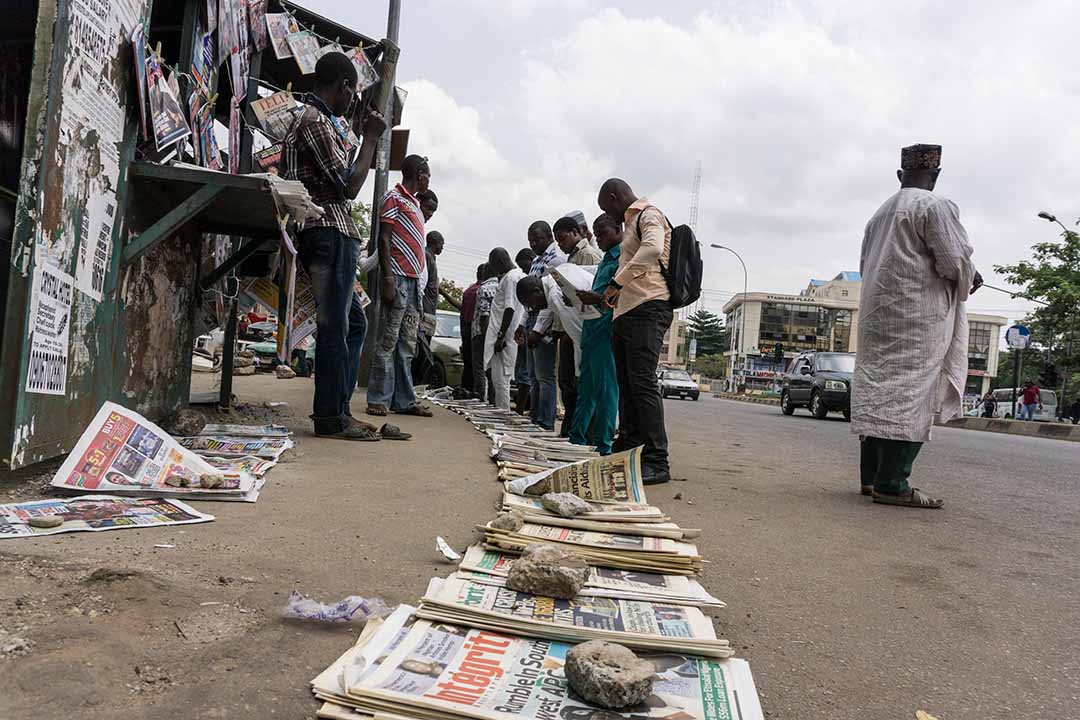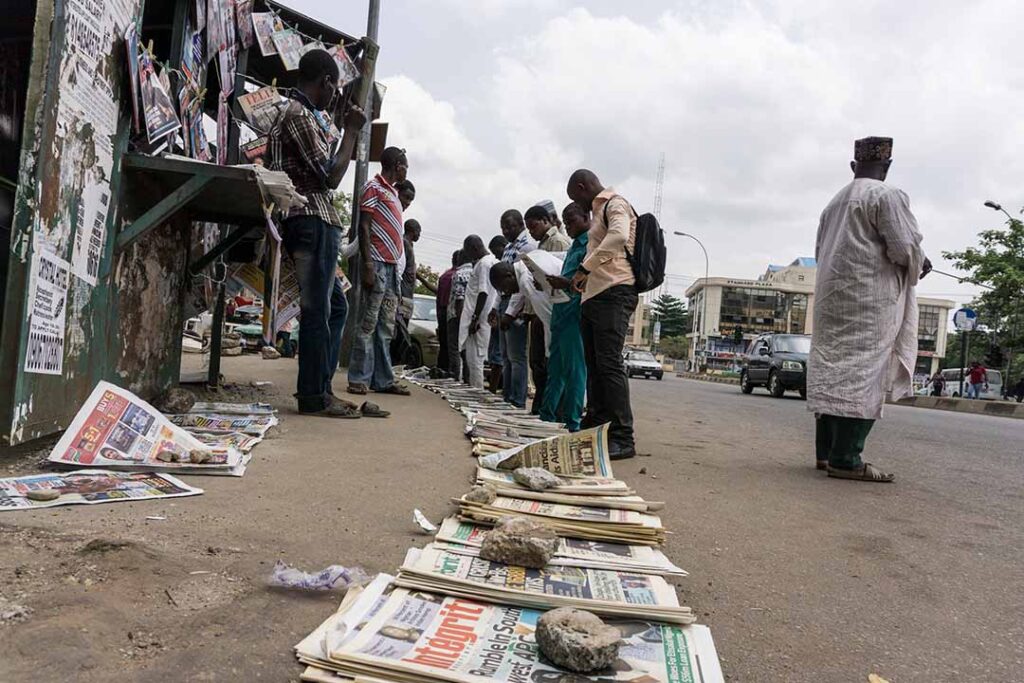Nigeria: repressive government vs recalcitrant journalists
The Buhari regime’s efforts to muzzle the press threaten to set Nigerian democracy back by decades

Photo: STEFAN HEUNIS / AFP
I was in Lagos chewing roasted corn a little past 6pm one evening in October 2019 when an Abuja – based journalist rang me to inform me of a meeting at the headquarters of the Nigeria Correctional Service (NCS). The authorities were going to use the media to discredit my latest investigation, and I would subsequently be arrested and prosecuted on trumped-up charges. Back in July, I’d voluntarily spent two weeks in detention — five days in a police cell and eight as an inmate in Ikoyi Prison — to track corruption in Nigeria’s criminal justice system, beginning from the moment of arrest by the police to the point of release from prison. To experience the workings of the system in its raw state, I adopted the pseudonym Ojo Olajumoke and feigned an offence for which I was arrested and detained in police custody, arraigned in court and eventually remanded in prison.
I dismissed the phone call with a wave of the hand until exactly 9.41pm, when a WhatsApp message from a friend directed me to a tweet by @ AbdulMahmud01, who, I have to say, is a board member of the International Centre for Investigative Reporting (ICIR), which co-funded the story I had written with TheCable. Mahmud, relying on his sources, was sure I would be arrested. I made two more calls that night and it was clear I was in trouble. The first thing I did was to pull out of a Goethe Institut event in Lagos, where I was to join three other panellists in discussing the subject ‘Fake or Fact: Disinformation and (New) Media in Nigeria’. Dr Chidi Odinkalu, the former chairman of the National Human Rights Commission (NHRC), kick-started the trending of a hashtag ‘KeepFisayoSafe’ that would eventually force government to back down on the planned arrest. The outrage that followed preceded — and scuppered — the arrest. Other journalists, though, were not that lucky. One of them, Agba Jalingo, was well into his detention before it became public knowledge.
In July 2019, the journalist had accused Ben Ayade, the governor of Cross River, a state in Nigeria’s South-South, of diverting N500 million (about $1.4 million) released for the establishment of the Cross River State Microfinance Bank. He seemed to have good evidence, having consistently reported, through the years, about the establishment of the bank and its failure to take off eight months after the supposed release of the funds. Since his arrest in August last year, the Nigerian government has charged Jalingo with disturbance of public peace, cybercrime, terrorism and treason. Twice the court granted him bail, and twice the government denied him the opportunity to enjoy it. After almost a year of struggling to convince Nigerians that it was innocent of involvement in Jalingo’s arrest, the Cross River State government finally officially took over his prosecution in February this year.
Omoyele Sowore, human rights activist and founder of online news agency Sahara Reporters, hadn’t even kicked off his #RevolutionNow protests when the Department of State Services (DSS) picked him up at a private apartment in Lagos on 2 August, 2019 — three days before the start of the #DaysOfRage. He was grilled in Abuja for days before the orders of a federal high court were sought for his detention. But after state security disobeyed two orders by the same court for Sowore’s release on bail after months in detention, the tide started to turn against the government. On 24 December, three days after six US lawmakers wrote to the Nigerian Attorney-General to protest Sowore’s continued detention, the government released him, disguising their action by simultaneously freeing Sambo Dasuki, the former National Security Adviser (NSA) who had been held since 2015 for alleged misappropriation of counterinsurgency funds.
Locally, the release was preceded by a landmark move: Punch, Nigeria’s most widely read newspaper, published a weighty editorial announcing that all its titles would henceforth prefix President Muhammadu Buhari’s name with his rank as a military dictator in the 80s, Major General, and refer to his administration as a regime, “until they purge themselves of their insufferable contempt for the rule of law”. In all three instances, the most notable constant was the bad press that government was getting or would have got. Jalingo’s Cross River Watch series projected the state government as corrupt, inept and unworthy of public trust. Sowore’s #RevolutionNow protests would have spotlighted the deep seated economic maladministration and insecurity that have plagued the Buhari administration since inception. My investigative series unveiled the sham that is the administration of criminal justice in Nigeria; it was a dent in the image of the judiciary, the police, the prisons and the interior ministry altogether.
The irony of this media repression is that Buhari and the state governors of his party, the All Progressives Congress (APC), ascended to power via the polls on the back of dissent with the former ruling party and championed by the media; the same group suddenly cannot stomach or overlook unflattering media coverage. It must irk them deeply that despite the repression, these journalists are not only refusing to cave in, they’re waxing strong. Their persecution appears to be further fuelling their drive rather than dampening it. The grace with which Jalingo has handled his trial belies the length of his incarceration. His broad smiles, loud cheers to supporters and generally boisterous demeanour on court days do not in any way suggest he’s spent six months in prison. Four weeks after the government tried to arrest me for investigating the police, prisons and courts undercover, I embarked on another undercover mission — this time to a government-run psychiatric hospital, the Federal Neuropsychiatric Hospital in Lagos, where admission conditions are undignified. I was their patient for three weeks, including 10 straight days on ward admission.
The previous arrest threat didn’t stop me and, as a matter of fact, I’m currently on my second investigation since that saga. Sowore, meanwhile, remains as bullheaded as he always was. In early February, when I met him in Abuja at the makeshift home he’s currently restricted to due to a clause in his bail conditions barring him from travelling out of Nigeria’s federal capital, he insisted his ongoing face-off with the state would be a “fight to the finish”. “I don’t care that I cannot travel out of Abuja; that’s their problem, not mine,” he told me confidently. “There’s no need to run away. We have to stay and fight this battle until the very end.” Repeated efforts to muzzle the press under the Buhari regime threaten to set Nigerian democracy back by decades. However, just like it was with every oppressive military administration of the past, this government will be outlasted by the media — because, as we have seen, the current targets of media oppression are on their crusade for the long haul.



